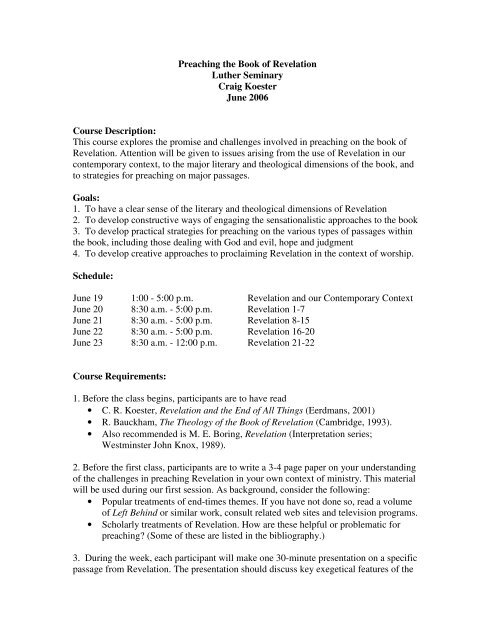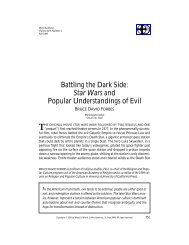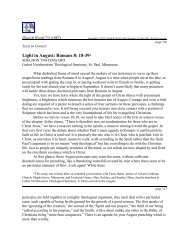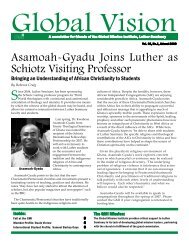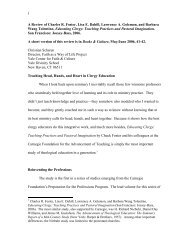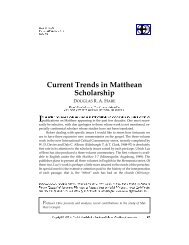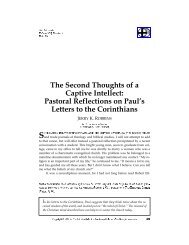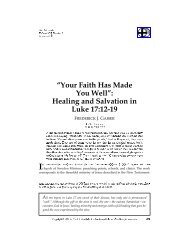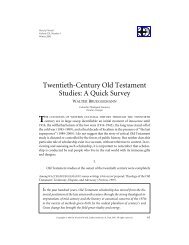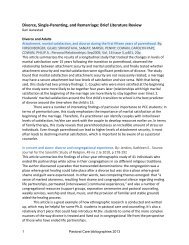Preaching the Book of Revelation Luther Seminary Craig Koester ...
Preaching the Book of Revelation Luther Seminary Craig Koester ...
Preaching the Book of Revelation Luther Seminary Craig Koester ...
- No tags were found...
You also want an ePaper? Increase the reach of your titles
YUMPU automatically turns print PDFs into web optimized ePapers that Google loves.
<strong>Preaching</strong> <strong>the</strong> <strong>Book</strong> <strong>of</strong> <strong>Revelation</strong>Lu<strong>the</strong>r <strong>Seminary</strong><strong>Craig</strong> <strong>Koester</strong>June 2006Course Description:This course explores <strong>the</strong> promise and challenges involved in preaching on <strong>the</strong> book <strong>of</strong><strong>Revelation</strong>. Attention will be given to issues arising from <strong>the</strong> use <strong>of</strong> <strong>Revelation</strong> in ourcontemporary context, to <strong>the</strong> major literary and <strong>the</strong>ological dimensions <strong>of</strong> <strong>the</strong> book, andto strategies for preaching on major passages.Goals:1. To have a clear sense <strong>of</strong> <strong>the</strong> literary and <strong>the</strong>ological dimensions <strong>of</strong> <strong>Revelation</strong>2. To develop constructive ways <strong>of</strong> engaging <strong>the</strong> sensationalistic approaches to <strong>the</strong> book3. To develop practical strategies for preaching on <strong>the</strong> various types <strong>of</strong> passages within<strong>the</strong> book, including those dealing with God and evil, hope and judgment4. To develop creative approaches to proclaiming <strong>Revelation</strong> in <strong>the</strong> context <strong>of</strong> worship.Schedule:June 19 1:00 - 5:00 p.m. <strong>Revelation</strong> and our Contemporary ContextJune 20 8:30 a.m. - 5:00 p.m. <strong>Revelation</strong> 1-7June 21 8:30 a.m. - 5:00 p.m. <strong>Revelation</strong> 8-15June 22 8:30 a.m. - 5:00 p.m. <strong>Revelation</strong> 16-20June 23 8:30 a.m. - 12:00 p.m. <strong>Revelation</strong> 21-22Course Requirements:1. Before <strong>the</strong> class begins, participants are to have read• C. R. <strong>Koester</strong>, <strong>Revelation</strong> and <strong>the</strong> End <strong>of</strong> All Things (Eerdmans, 2001)• R. Bauckham, The Theology <strong>of</strong> <strong>the</strong> <strong>Book</strong> <strong>of</strong> <strong>Revelation</strong> (Cambridge, 1993).• Also recommended is M. E. Boring, <strong>Revelation</strong> (Interpretation series;Westminster John Knox, 1989).2. Before <strong>the</strong> first class, participants are to write a 3-4 page paper on your understanding<strong>of</strong> <strong>the</strong> challenges in preaching <strong>Revelation</strong> in your own context <strong>of</strong> ministry. This materialwill be used during our first session. As background, consider <strong>the</strong> following:• Popular treatments <strong>of</strong> end-times <strong>the</strong>mes. If you have not done so, read a volume<strong>of</strong> Left Behind or similar work, consult related web sites and television programs.• Scholarly treatments <strong>of</strong> <strong>Revelation</strong>. How are <strong>the</strong>se helpful or problematic forpreaching? (Some <strong>of</strong> <strong>the</strong>se are listed in <strong>the</strong> bibliography.)3. During <strong>the</strong> week, each participant will make one 30-minute presentation on a specificpassage from <strong>Revelation</strong>. The presentation should discuss key exegetical features <strong>of</strong> <strong>the</strong>
text and strategies for preaching on it. A specific passage will be assigned to eachparticipant by email.4 Participants will prepare and preach one sermon that reflects <strong>the</strong>ir learning in <strong>the</strong>course. The sermon should be based on a passage from <strong>Revelation</strong> o<strong>the</strong>r than <strong>the</strong> onethat <strong>the</strong> student presented on in class. All sermons will be preached and videotapedduring a weekly worship service sometime before November 6.5. A 2-4 page reflection paper that accompanies <strong>the</strong> final sermon. The paper shoulddescribe <strong>the</strong> preacher’s hermeneutical approach to <strong>the</strong> text, and <strong>the</strong> strategies used topreach <strong>the</strong> text. The video tape <strong>of</strong> this sermon and accompanying materials must be sentto <strong>the</strong> instructor by November 6, 2006. Earlier submissions (summer and early fall) arehighly encouraged!SELECTED BIBLIOGRAPHY ON REVELATIONCommentaries on <strong>Revelation</strong>Aune, David. <strong>Revelation</strong>. 3 vols. Word Biblical Commetary. Dallas: Word, 1997-98. Auneprovides historical information, word studies, and summaries <strong>of</strong> o<strong>the</strong>r scholars, but gives littleattention to <strong>the</strong>ology. The text is difficult to read, but is useful for certain kinds <strong>of</strong> scholarlyinformation.Beale, G. K. The <strong>Book</strong> <strong>of</strong> <strong>Revelation</strong>. New International Greek Testament Commentary. GrandRapids: Eerdmans, 1999. An extremely long commentary that reads <strong>Revelation</strong> primarily inlight <strong>of</strong> <strong>the</strong> Old Testament. Generally conservative, evangelical perspective.Boring, M. Eugene. <strong>Revelation</strong>. Interpretation. Louisville: John Knox, 1989. A usefulcommentary for teaching and preaching. The book works through <strong>Revelation</strong> section bysection giving attention to key issues and reflections on <strong>the</strong> meaning for people today.Caird, G. B. A Commentary on <strong>the</strong> <strong>Revelation</strong> <strong>of</strong> St John <strong>the</strong> Divine. Black’s New TestamentCommentary. London: A. & C. Black, 1984 (originally 1966). A non-technical commentarythat is interesting to read. Gives attention both to <strong>the</strong> historical and <strong>the</strong>ological dimensions <strong>of</strong><strong>the</strong> text.<strong>Koester</strong>, <strong>Craig</strong> R. <strong>Revelation</strong> and <strong>the</strong> End <strong>of</strong> All Things. Grand Rapids: Eerdmans, 2001. Thisstudy is designed for general use. The introduction deals with perspectives on <strong>the</strong> book, and<strong>the</strong> remaining chapters work through <strong>Revelation</strong> in sequence so that it can serve as acommentary on <strong>the</strong> text. It is also divided into chapters that can be used week by week inparish Bible studies.Mounce, Robert H. The <strong>Book</strong> <strong>of</strong> <strong>Revelation</strong>. Rev. ed. Grand Rapids: Eerdmans, 1977. A helpfuland balanced commentary from an evangelical perspective. Explores <strong>Revelation</strong>’s meaningfor its original readers and includes reflections that are helpful for contemporary teaching andpreaching.
Murphy, Frederick J. Fallen Is Babylon: The <strong>Revelation</strong> to John. Harrisburg: Trinity PressInternational, 1998. This historically oriented commentary deals with <strong>the</strong> context in which<strong>Revelation</strong> was written and considers how its message would have addressed its earliestreaders.Reddish, Mitchell G. <strong>Revelation</strong>. Smyth & Helwys, 2001. A historically informative commentarythat includes photographs <strong>of</strong> biblical sites related to <strong>the</strong> book <strong>of</strong> <strong>Revelation</strong>.Rowland, Christopher. “The <strong>Book</strong> <strong>of</strong> <strong>Revelation</strong>” in The New Interpreter’s Bible vol. 12.Nashville: Abingdon, 1998. Rowland takes a largely literary approach to <strong>Revelation</strong>, ra<strong>the</strong>rthan focusing as much on historical questions. The commentary includes reflections on <strong>the</strong>text for today.Schüssler Fiorenza, Elizabeth. <strong>Revelation</strong>: Vision <strong>of</strong> a Just World. Proclamation Commentaries.Minneapolis: Fortress, 1991. This study considers <strong>Revelation</strong> in light <strong>of</strong> liberation <strong>the</strong>ology.It deals with <strong>the</strong> book’ s message in light <strong>of</strong> <strong>the</strong> powers that oppressed people in <strong>the</strong> firstcentury and today. The book is short and readable.Smalley, Stephen S. The <strong>Revelation</strong> to John: A Commentary on <strong>the</strong> Greek Text <strong>of</strong> <strong>the</strong> Apocalypse.Downers Grove, IL: InterVarsity, 2005. A detailed commentary on <strong>the</strong> Greek text with someattention to <strong>the</strong>ological issues.General Studies <strong>of</strong> <strong>Revelation</strong>Bauckham, Richard. The Theology <strong>of</strong> <strong>the</strong> <strong>Book</strong> <strong>of</strong> <strong>Revelation</strong>. Cambridge: Cambridge University,1993. This is a very readable and engaging study <strong>of</strong> <strong>Revelation</strong>’ s <strong>the</strong>ology. Topics include itsunderstanding <strong>of</strong> God, Christ, <strong>the</strong> Spirit, and <strong>the</strong> nature <strong>of</strong> prophecy. Especially interesting ishis treatment <strong>of</strong> <strong>Revelation</strong>’ s hope for <strong>the</strong> nations <strong>of</strong> <strong>the</strong> world.Collins, John J. The Apocalyptic Imagination: An Introduction to Jewish Apocalyptic Literature.2 nd ed. Grand Rapids: Eerdmans, 1998. This is a very helpful introduction to <strong>the</strong> world <strong>of</strong>Jewish apocalyptic writing. It does not deal with <strong>Revelation</strong>, but discusses works similar to it.Thompson, Leonard L. The <strong>Book</strong> <strong>of</strong> <strong>Revelation</strong>: Apocalypse and Empire. New York: OxfordUniversity Press, 1990. Thompson argues that <strong>the</strong> Christians addressed by <strong>Revelation</strong> werefairly well adjusted to life in Asia Minor, and that <strong>the</strong> imperial cult was not much <strong>of</strong> a threat.His view differs sharply from that <strong>of</strong> Yarbro Collins and Schüssler Fiorenza.Yarbro Collins, Adela. Crisis and Catharsis: The Power <strong>of</strong> <strong>the</strong> Apocalypse. Philadelphia:Westminster, 1984. Yarbo Collins works with <strong>the</strong> idea that <strong>Revelation</strong> moves in cycles <strong>of</strong>visions. She makes <strong>the</strong> case that <strong>Revelation</strong> did not so much address a time <strong>of</strong> persecution asit tried to awaken people to a crisis that <strong>the</strong>y could not see.Examples <strong>of</strong> Approaches for Lay PeopleDawn, Marva. Joy in Our Weakness. Grand Rapids: Eerdmans. Written in popular style withmany anecdotes woven into reflections on <strong>Revelation</strong>.
Peterson, Eugene. Reversed Thunder: The <strong>Revelation</strong> <strong>of</strong> John and <strong>the</strong> Praying Imagination. Apopular preacher and teacher, Peterson produced <strong>the</strong> paraphrase <strong>of</strong> <strong>the</strong> Bible entitled TheMessage.Rossing, Barbara. Rapture Exposed. The Message <strong>of</strong> Hope in <strong>the</strong> <strong>Book</strong> <strong>of</strong> <strong>Revelation</strong>. Boulder:Westview, 2004. Rossing tries to show some <strong>of</strong> <strong>the</strong> political dimensions <strong>of</strong> rapture <strong>the</strong>ology.She develops arguments against it while formulating a more hopeful approach to <strong>Revelation</strong>.Examples <strong>of</strong> Futuristic / Dispensationalist InterpretationLaHaye, Tim. <strong>Revelation</strong> Unveiled. Grand Rapids: Zondervan, 1999. LaHaye is one <strong>of</strong> <strong>the</strong>authors <strong>of</strong> Left Behind. Here he gives a dispensationalist reading <strong>of</strong> <strong>Revelation</strong>. E.g., <strong>the</strong>comments on Rev 4 begin with an extensive discussion <strong>of</strong> <strong>the</strong> rapture <strong>the</strong>ory based on textsoutside <strong>of</strong> <strong>Revelation</strong>._______ and Jerry Jenkins, Left Behind: A Novel <strong>of</strong> <strong>the</strong> Earth’s Last Days. Wheaton: Tyndale,1995. This is <strong>the</strong> first volume in a tremendously popular fiction series. It presentsdispensationalist <strong>the</strong>ology in <strong>the</strong> form <strong>of</strong> Christian fiction. You can also check <strong>the</strong>ir websiteleftbehind.com.Osborne, Grant R. <strong>Revelation</strong>. Grand Rapids: Baker, 2002. This commentary follows a futuristicinterpretation but gives attention to <strong>the</strong> historical implications <strong>of</strong> <strong>the</strong> text. There is detailedcommentary on each passage <strong>of</strong> <strong>the</strong> book.Thomas, Robert L. <strong>Revelation</strong>. 2 vols. Chicago: Moody Press, 1995. This commentary follows<strong>the</strong> dispensationalist system <strong>of</strong> Darby, LaHaye, and o<strong>the</strong>rs, giving a more scholarly rationalefor a futuristic reading.


